外研高二选修7 Module 3 Literature 模块复习课件(70张)
文档属性
| 名称 | 外研高二选修7 Module 3 Literature 模块复习课件(70张) |
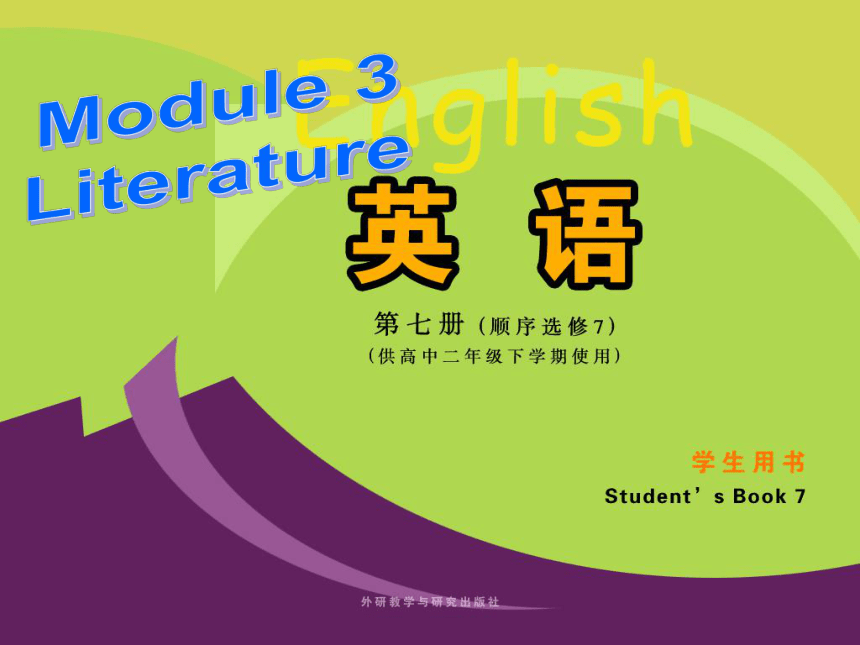
|
|
| 格式 | zip | ||
| 文件大小 | 529.8KB | ||
| 资源类型 | 教案 | ||
| 版本资源 | 外研版 | ||
| 科目 | 英语 | ||
| 更新时间 | 2017-01-18 00:00:00 | ||
图片预览


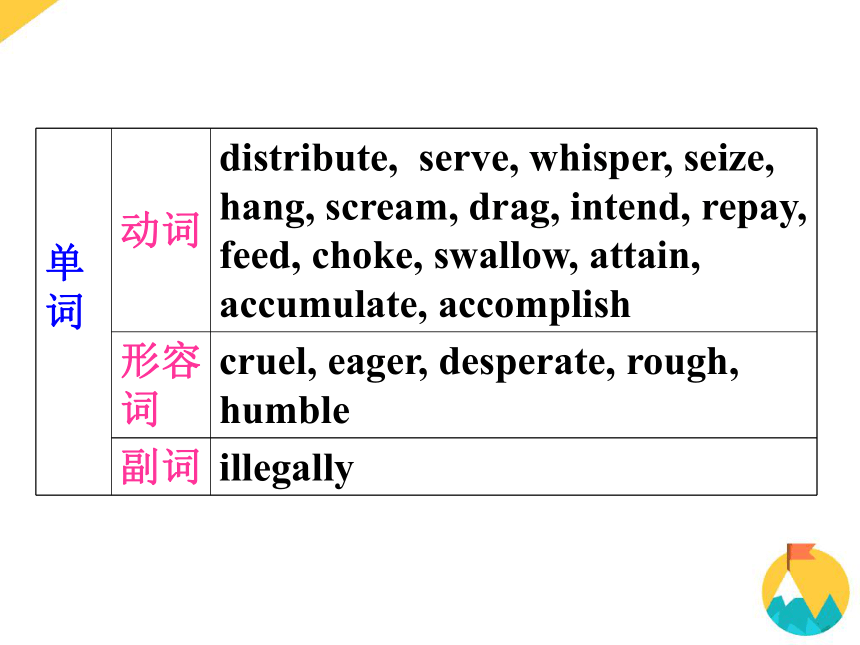

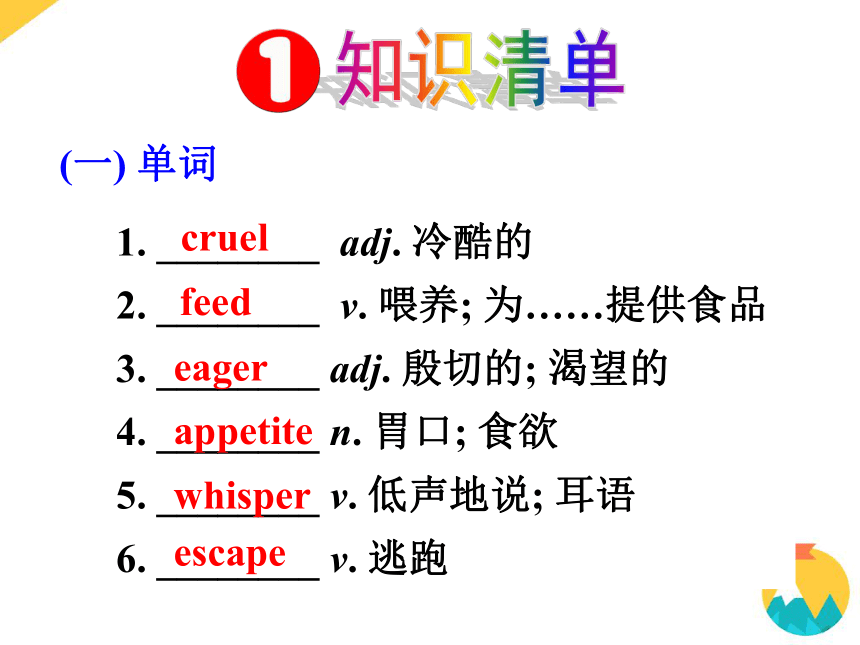
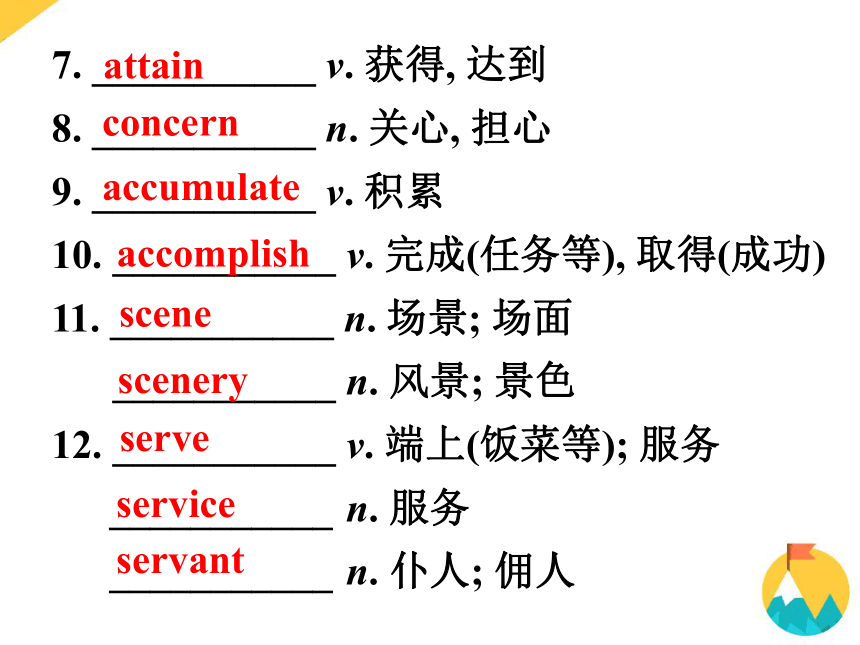
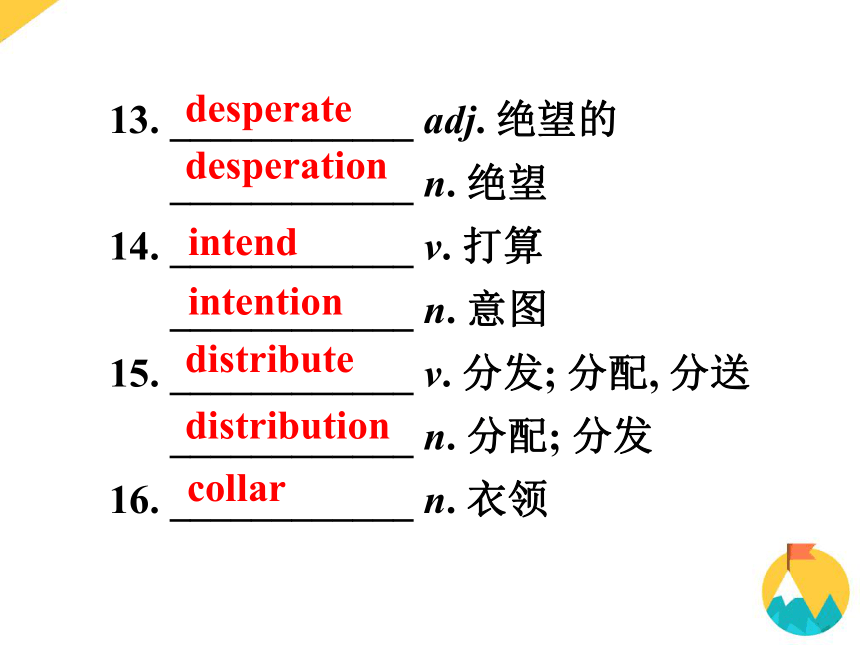
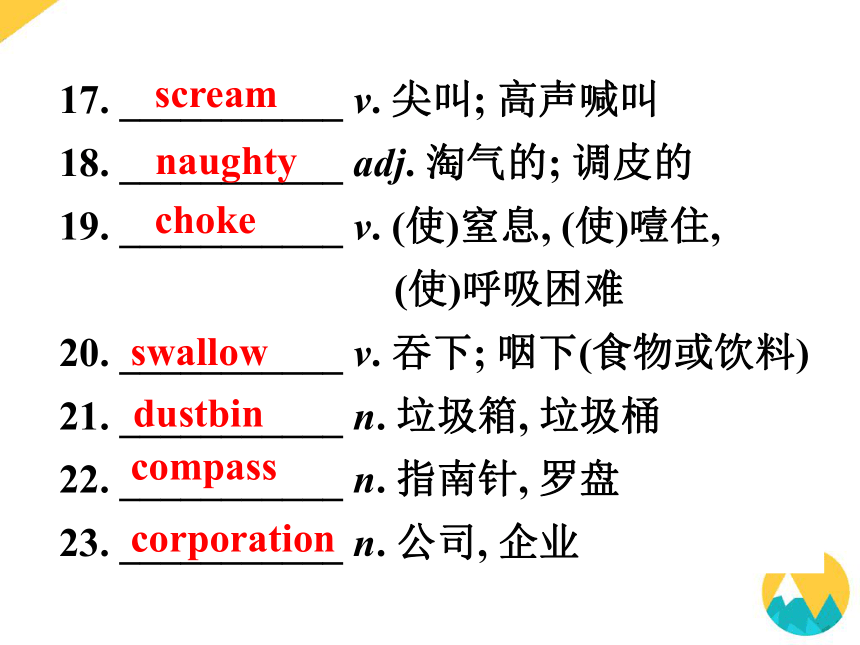
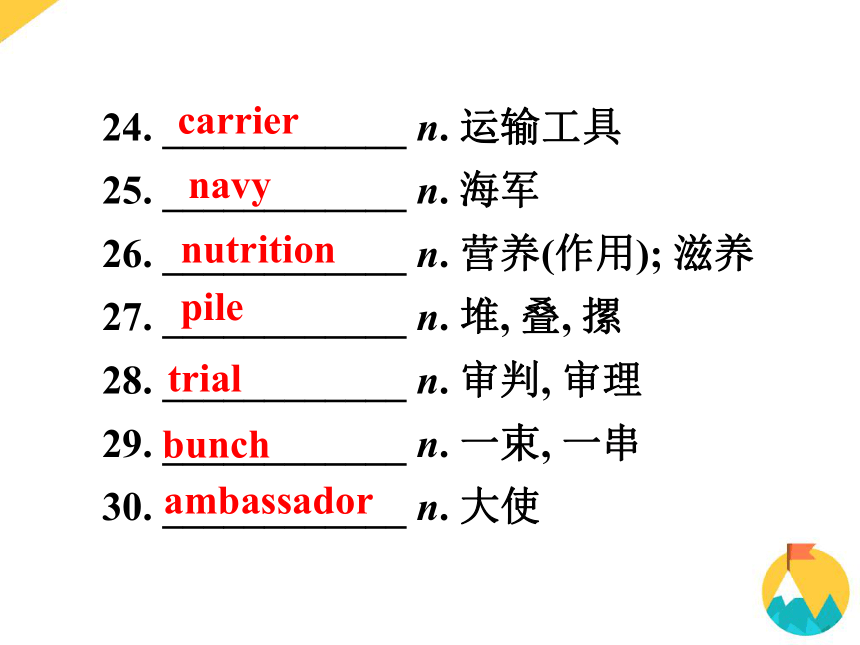
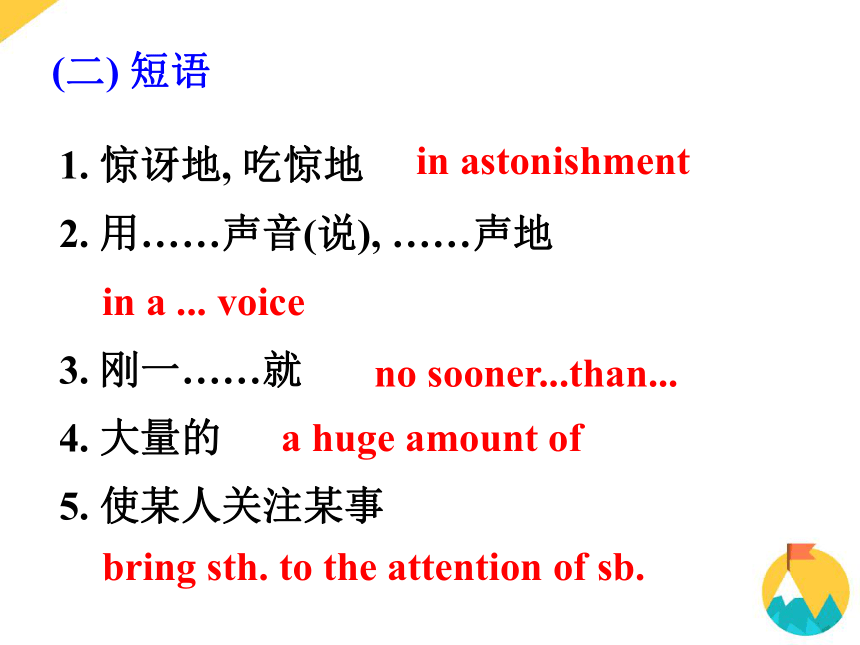
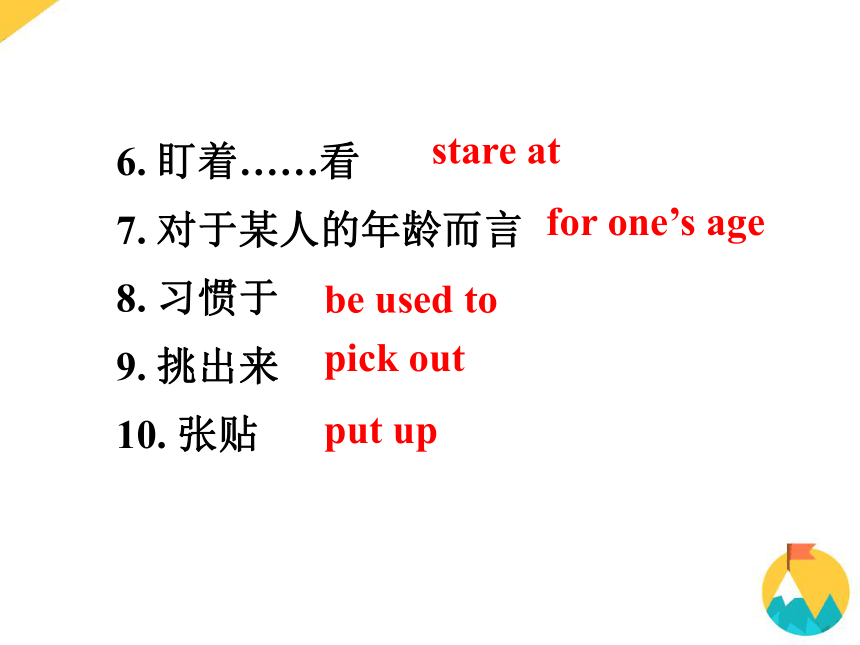

文档简介
课件70张PPT。Module 3
Literature知识归纳1. ________ adj. 冷酷的
2. ________ v. 喂养; 为……提供食品
3. ________ adj. 殷切的; 渴望的
4. ________ n. 胃口; 食欲
5. ________ v. 低声地说; 耳语
6. ________ v. 逃跑知识清单(一) 单词cruelfeedeagerappetitewhisperescape7. ___________ v. 获得, 达到
8. ___________ n. 关心, 担心
9. ___________ v. 积累
10. ___________ v. 完成(任务等), 取得(成功)
11. ___________ n. 场景; 场面
___________ n. 风景; 景色
12. ___________ v. 端上(饭菜等); 服务
___________ n. 服务
___________ n. 仆人; 佣人attainconcernaccumulateaccomplishscenesceneryserveserviceservant13. ____________ adj. 绝望的
____________ n. 绝望
14. ____________ v. 打算
____________ n. 意图
15. ____________ v. 分发; 分配, 分送
____________ n. 分配; 分发
16. ____________ n. 衣领desperatedesperationintendintentiondistributedistributioncollar17. ___________ v. 尖叫; 高声喊叫
18. ___________ adj. 淘气的; 调皮的
19. ___________ v. (使)窒息, (使)噎住,
(使)呼吸困难
20. ___________ v. 吞下; 咽下(食物或饮料)
21. ___________ n. 垃圾箱, 垃圾桶
22. ___________ n. 指南针, 罗盘
23. ___________ n. 公司, 企业screamnaughtychokeswallowdustbincompasscorporation24. ____________ n. 运输工具
25. ____________ n. 海军
26. ____________ n. 营养(作用); 滋养
27. ____________ n. 堆, 叠, 摞
28. ____________ n. 审判, 审理
29. ____________ n. 一束, 一串
30. ____________ n. 大使carriernavynutritionpiletrialbunchambassador1. 惊讶地, 吃惊地
2. 用……声音(说), ……声地
3. 刚一……就
4. 大量的
5. 使某人关注某事(二) 短语in astonishment in a ... voiceno sooner...than...a huge amount ofbring sth. to the attention of sb.6. 盯着……看
7. 对于某人的年龄而言
8. 习惯于
9. 挑出来
10. 张贴stare atfor one’s agebe used topick output up1. feed vt. 喂(养), 饲养; 供给,
向……提供食物
vi. (牛、马等)吃东西
【归纳】
feed on 以……为主食, 吃……过日子
feed...on/with sth. 给……食物核心要点feed sth. to sb./sth.= feed sb./sth. on/with sth.
用……喂养; 给(人或动物)食物
feed A with B = feed B into A 提供B给A用feed及其短语完成下列句子。
1. Bats come out only at night and _______ insects.
2. On Emei Mountain, tourists have to ______ monkeys ______ peanuts and so on or the monkeys won’t let them pass.
3. A child often ______ too much food ______ his pet.
4. It’s your turn to ______ the birds and I’m busy now.?feed onfeedonfeedstofeed2. serve v. 为……服务; 服役; 提供, 供应
(with);作……之用, 合乎(目的)(as, for);
供应(饭菜), 侍候吃饭, 端菜
【归纳】
serve + n. 为……服务, 效力; 端上
serve sb. (with) 给某人端上……
serve sth. to sb. 把……端给某人
serve as (for) 充当……
【拓展】
service n.服务汉译英。
1. 在这个城镇里,我们的煤气供应得很好。
2. 如果椅子不够坐,这箱子可用来当作椅子。
3. 学校为孩子们提供午餐。????????????? We are well served with gas in this town.If there are not enough chairs, this box can serve as a chair.The school serves lunch to children.? 4. 那些大学生积极为奥运会服务。
5. 我哥哥参军已经10年了。The college students are active to serve the Olympics.My brother has served in the army for 10 years.3. eager adj. 热切的, 渴望的
【归纳】
be eager for sth. 渴望得到某物
be eager for sb. to do 渴望某人做……
be eager to do sth.
渴望做某事, 极想做某事
be eager+that-clause 渴望做……
【拓展】
eagerness n. 渴望, 渴求
with eagerness 殷切地根据汉语意思补全下列句子。
1. 班上每个人似乎都热爱学习。
Everyone in the class ___________________.
2. 记者们围着发言人,想得到更多的消息。
The journalists crowded round the spokesperson, ________________________.
3. 莫妮卡无法掩饰回家的渴望。
Monica couldn’t hide ___________________
________________.seemed eager to learn?eager for more newsher eagerness to getback home4. seize v. 抓住; 夺取(某物), 占领, 获得;
抓住, 把握(机会)
【归纳】
seize sth. from sb. 从某人那里夺取某物
seize a chance/an opportunity
抓住机会/机遇
seize on/upon sth.
突然大为关注, 抓住(可利用的事物)翻译下列句子。
1. He seized her hand and shook it warmly.
2. Seize the chance, otherwise you’ll regret it.他抓住她的手热情地握着。抓住这个机会,?否则你会后悔的。5. hang v. 悬, 挂, 吊 (hang-hung-hung)
绞死, 吊死 (hang-hanged-hanged)
【归纳】
hang on 抓紧; 停一下; 别挂电话, 等一下
hang up 悬挂; 挂断电话; 中止
hang onto 紧紧抓住; 保留(某物)
hang about/around 闲荡, 闲待着
hang out 常去某处; 泡在某处6. intend v. 想要, 打算, 意欲; 计划; 主张
【归纳】
intend to do/doing sth. 打算做某事
intend sb. to do sth. 打算让某人做某事
intend+that-clause
打算…… (从句中谓语动词用should+动
词原形, should可省略)
【拓展】
intention n. 意图, 目的; 打算
have no intention of doing sth.
无意做某事; 不打算做某事汉译英。
1. 我打算让女儿当医生。
2. 大学毕业后你计划做什么?
?
3. 他打算不久就回国。I intend my daughter to be a doctor. What do you intend to do after you graduate from college?He intends coming back from abroad / to his country soon.7. whisper n. 耳语; 私语; 谣传
v. 耳语; 密谈; 低声地说
【归纳】
in a whisper = in whispers 耳语地, 低声地
whisper sth. to sb. = whisper sb. sth.
向某人低声说
whisper sth. in one’s ear
在某人耳旁小声说……
It is/was whispered that...
有人私下说……8. scene n. 现场; 情景; 景色;
(戏剧的)一场; 布景
【归纳】
behind the scenes 在后台; 在幕后
on the scene 出现; 登场
scene of the accident/attack/crime
事故/袭击/犯罪的现场1) scene是常用词, 指局部的或周围的环境、风景、景色, 尤其与观看者看法有关, 也可指戏剧、电影、小说等的情景、布景。
2) scenery(集合名词)并非个别的风景, 而是指该地区的整个风景。scene/scenery/sight/view3) sight作“景物, 浏览胜地”解时常用复数形式, 表示各种各样引起人兴趣的地方; 作“情景, 景象”时常用单数。
4) view是可数名词, 表示从某处可见到的远景, 着重点在你能够看到的部分。9. reward n. 酬谢; 奖赏; 赏金
vt. 给(某人)报酬, 奖励(某人)
【归纳】
as a reward of 作为对……的回报
in reward for sth. 为了酬谢或报答……
give/offer a reward to sb. for sth.
为某事而给某人报酬
reward sb. for sth. 为某事报答某人
reward sb. with sth.
用……报答/回报某人prize/award/reward10. accomplish v. 完成(任务等); 取得成功1) accomplish常接task, journey, voyage等名词,有时兼有“达成(效果)”之意。
2) complete比accomplish具体,可接建筑、工程、书籍等名词,指“按预期目的把未完成的工作经过进一步的努力使之完成”,主要含义是“补足缺少的部分”。accomplish/complete/finish/achieve3) finish在许多情况下可与complete换用, 但不如complete正式, 常含有认真仔细地完成工作的最后阶段的精工修饰, 使之完美的意思。
4) achieve多指排除困难, 完成宏伟计划或大业。11. in astonishment (=in surprise)
吃惊地, 惊讶地
【归纳】
to one’ s astonishment 令某人吃惊的是
【拓展】
in silence 寂静地
in anger 生气地
in satisfaction 满意地12. a huge amount of 大量的
英语中有些表示“许多, 大量”的短语, 后
接可数名词与不可数名词情况不同a good/great many
a large/great/good number of
a good few/quite a few+可数名词复数(作主语时, 谓语动词用复数)many a/an+单数可数名词 (作主语时, 谓语动词用单数)a good/great deal of
a large/great amount of
quite a little+不可数名词(作主语时, 谓语动词用单数)a lot of/lots of
plenty of
a large/great quantity of+可数名词复数或不可数名词(作主语时, 谓语动词要根据名词确定)large quantities of+可数名词复数或不可数名词(作主语时, 谓语动词用复数)从括号内选择适当的词填空。
1. A large number of houses ______ (was?? /? were) destroyed in the earthquake.
2. Large amounts of my spare time ______ (is? / are) wasted in watching TV series.
3. A large quantity of flowers ______ (has / have) been planted in our school.wereare?has 13. pick out 精心挑选; 认出来;
找出, 认识到; 使显著
【拓展】
pick at sth. 磨蹭着吃; 小口吃
pick sth. off 去除; 剪除
pick over sth. 用心挑选; 筛选
pick up 接电话; 接人; 举起, 拿起;
听到; 学会
pick off 摘掉,摘下 用适当的介词或副词填空。
1. Though this picture was taken a long time ago, I can still pick ________ your father.
2. In that way, I’ll be able to pick ______ some useful knowledge, too.
3. Don’t pick _____ any of these flowers; they are for decorating.
4. His story was picked ______ as the best by the judges.out??up?offout14. bring sth. to the attention of sb.
使某人关注某事
【拓展】
pay attention to 注意……
catch one’s attention
吸引某人的注意力
focus one’s attention on sth. 注意某事
Attention, please. 请注意。
stand at attention 立正 根据提示写出所缺单词的正确形式。
1. He gave the children some chocolates to r________ them for behaving well.
2. The government will __________ (分发) clothes and food in the earthquake-stricken area.
3. I ________ (打算) to catch the early train, but I didn’t get up in time.Exercisesrewarddistributeintended?4. The situation is d________ — we have no food, very little water and no medical supplies.
5. There’s no need for you to ________ (使关心) yourself with what happened.desperateconcern选择方框内合适的短语, 并用其适当形式填空(每个短语限用一次)。pick out put up hold on to be fond of1. My brother _________ photography. He prefers photographing people rather than places.
2. Every dress in the big mall was so beautiful that it took Mary a long time to ________ one.is fond ofpick out3. I bought the second-hand bike from a man who ________ a notice on the bulletin board a week ago.
4. When I saw the fierce animal I was so frightened that I had to __________ myself not to scream.hold on toput uppick out put up hold on to be fond of1. No sooner had the boy spoken these words than the warden hit him on the head with the soup spoon.
孩子的话刚出口, 大师傅就操起勺子狠狠地敲他的脑袋。
no sooner...than... 意为“一……就……”, 为部分倒装, 此类型的句型分以下一些情况:句式1) Only 修饰的副词, 介词短语或状语从句放在句首时。
e.g. Only in this way can you learn from
your mistakes.
2) 含有否定意义的副词或连词, 如: hardly, never, not, not only, little等放在句首时。 e.g. Not a single mistake did he make.
Little does he cares about what others
think.3) 用于no sooner…than…, hardly…when…和not until的句型中。
e.g. Not until quite recently did he finish
his work.
4) as, however连接的让步副词分句。
e.g. Small as the pen is, it is a powerful
weapon.
However busy you are, you should
spend some time reading the newspaper.5) 省略连词if的条件副词分句。
e.g. Were I you, I would not do such a
thing.
Should the machine break down again,
send it back to us.
Had you worked harder, you would
have passed.6) 由连接词so, neither, nor引导的句子。
e.g. Tom can ride a bicycle; so can I.
She can’t sing; nor (neither) can he.
John has never been late; nor (neither)
have I.2. The room in which the boys were fed was a large stone hall, with a large pot at one end.
孩子们进餐的场所是一间宽敞的大石厅,一口大锅放在大厅一侧。
句子中含有with+宾语+宾补(介词短语)结构作状语, 介词短语作宾补表示宾语所处的状态。with+名词/介词+介词短语/形容词/副词/
不定式/分词构成复合结构, 在句中一般作
状语(有时可作定语), 表示谓语动词发生的
伴随情况、时间、原因、方式和条件等
e.g. When he is eating, he doesn’t speak with his mouth full of food.
他吃饭时, 他从不满嘴是饭地说话。
With the breakfast over, the boy hurried to school. 吃完早饭后, 那个小男孩急忙去学校了。He lay there with his eyes looking at the sky.
他躺在那里, 眼睛凝视着天空。
With five minutes to go before the last train left, we arrived at the station.
我们到达车站时, 还有五分钟最后一班火车就要离开。强调句
强调句结构为“It is / was + 被强调部分 + that / who + 其它”。这一句型可以对句子中的主语、宾语或状语等加以强调。
其中: ① It是无实义的引导词,不可用This或That替换;② 此结构可以用来强调除谓语动词以外的任何成分;③ 当被强调部分指人时,连接词可用who(m),其余情况一律用that。 语法判断一个句子是否为强调句型,最有效的方法是把It is / was ... that / who(m) ... 去掉,如果句子结构完整(有时要调整语序),句意正确,则为强调结构。
1. it后面的be动词前也可加might, may, must
等情态动词,表示说话人的语气。
e.g. It might be in the taxi that I left my
handbag.
It must be Tom who broke the window.2. 无论所强调的是单数还是复数,it后都用be动词的单数形式。
e.g. It was these students that / who have
made so many mistakes.
3. 主谓要一致。强调主语时,that / who之后的谓语在人称或数上应与其主语保持一致。
e.g. It is Tom who is against your plan.
It is I who am to blame.4. 其一般疑问句式:Is / Was + it + 被强调部分 + that / who + 其它?若含情态动词则将情态动词提前。
e.g. Was it Professor Wang that you
met in the street yesterday?
Can it be a UFO that he is describing?5. 其特殊疑问句式:疑问词 + is / was + it + that / who + 其它?
e.g. What is it that has made Ann so
excited?
Who was it that worked out the
problem first?
(注意:以who开头的强调句,后面不能用who引导,只能用that)6. 在not ... until句型中,当强调until引导的时间状语时,not须置于until之前,构成句式:It is / was + not until ... + that + 其它。
e.g. It was not until he took off his dark
glasses that I recognized him.1. It was 80 years before Christopher Columbus crossed the Atlantic _____ Zheng He had sailed to East Africa.???
A. when ? ? ? ? ? ? B. that??? ????
C. after ? ? ? ? ? ? ?D. since
[解析] 选B。分析题干可知本句是一个强调句,被强调的是80 years before Christopher Columbus crossed the Atlantic。2. I just wonder _____ that makes him so excited.?
A. why it does ? ? ? ? ? ?? B. what he does???
C. how it is?????????????????? D. what it is
[解析] 选D。此题考查强调句的特殊疑问句形式在宾语从句中的应用。首先,在宾语从句中要用陈述语序,又因特殊疑问词在that后的句子中作主语,故用what。3. I don’t mind her criticizing me, but _____ is how she does it that I object to. A. it??????? ?????? ????????????? B. that???????????
C. this??????????? ????????????? D. which
[解析] 选A。此题考查强调句型。被强调部分为宾语从句how she does it。受句式this / that is how ... 的影响,有可能误选B项或C项。巩固练习完成句子,使每组句子的意思相同或相近。
1. I have seldom played video games since I entered college.?
Seldom ________________ video games since I entered college.?
2. Mark had hardly opened the window when he smelt something burning.
Hardly __________________ the window when he smelt something burning.have I playedhad Mark opened?3. We couldn’t go on with our match until it stopped raining.
Not until it stopped raining ___________ go on with our match.could we阅读下面材料,在空白处填入适当的内容(不多于3个单词)或括号内单词的正确形式。
Poetry and drama have been around for thousands of years, but novel is a more recent form of literature. 1. ______________ some lengthy narrative works? appeared as early as the 14th century, the first true novels are said 2. _____________________ (appear) in the early 18th century. Although / Thoughto have appeared?At that time an eager well-educated middle-class person had 3. ____ appetite for reading, more free time to do it and more money to buy books, which could be printed more 4. ________ (easy) because of advances in printing. Also, unlike the lengthy narratives of the past, novels were written 5. ________ common people and their ordinary lives rather than the extraordinary 6. ________ (act) of noble heroes and heroines. an easily?aboutactionsNovels now fill the shelves of bookstores and libraries and there are many full-time novelists, 7. ________ books are distributed all over the world.
But 8. _____ isn’t easy to write a novel. Some novelists can accomplish 9. ________ (write) a novel in one year, but it’s not unusual for a novelist to spend 3-8 years researching the plot and working on and revising the chapters of a novel. whose?it? writing?The American writer Donna Tartt, for example, spent ten years 10. ________ her second and latest novel, “My Little Friend”.? on从A、B、C、D四个选项中, 选出可以填入空白处的最佳选项。
1. Not once _____ to Michael that he could
one day become a top student in his
class.
A. occurred it ? ? ? ? ? ? ?B. it did occur???????
C. it occurred????????????? D. did it occur2. Only when he apologizes for his rudeness _____ to him again.
A. I will speak ? ? ? ?B. will I speak?????????????
C. do I speak ? ? ? ??D. I speak3. “Never for a second,” the boy says, “_____ that my father would come to my rescue.”
A. I doubted ? ? ? ? ? ? ? ? B. do I doubt
C. I have doubted ? ? ? ? D. did I doubt
Literature知识归纳1. ________ adj. 冷酷的
2. ________ v. 喂养; 为……提供食品
3. ________ adj. 殷切的; 渴望的
4. ________ n. 胃口; 食欲
5. ________ v. 低声地说; 耳语
6. ________ v. 逃跑知识清单(一) 单词cruelfeedeagerappetitewhisperescape7. ___________ v. 获得, 达到
8. ___________ n. 关心, 担心
9. ___________ v. 积累
10. ___________ v. 完成(任务等), 取得(成功)
11. ___________ n. 场景; 场面
___________ n. 风景; 景色
12. ___________ v. 端上(饭菜等); 服务
___________ n. 服务
___________ n. 仆人; 佣人attainconcernaccumulateaccomplishscenesceneryserveserviceservant13. ____________ adj. 绝望的
____________ n. 绝望
14. ____________ v. 打算
____________ n. 意图
15. ____________ v. 分发; 分配, 分送
____________ n. 分配; 分发
16. ____________ n. 衣领desperatedesperationintendintentiondistributedistributioncollar17. ___________ v. 尖叫; 高声喊叫
18. ___________ adj. 淘气的; 调皮的
19. ___________ v. (使)窒息, (使)噎住,
(使)呼吸困难
20. ___________ v. 吞下; 咽下(食物或饮料)
21. ___________ n. 垃圾箱, 垃圾桶
22. ___________ n. 指南针, 罗盘
23. ___________ n. 公司, 企业screamnaughtychokeswallowdustbincompasscorporation24. ____________ n. 运输工具
25. ____________ n. 海军
26. ____________ n. 营养(作用); 滋养
27. ____________ n. 堆, 叠, 摞
28. ____________ n. 审判, 审理
29. ____________ n. 一束, 一串
30. ____________ n. 大使carriernavynutritionpiletrialbunchambassador1. 惊讶地, 吃惊地
2. 用……声音(说), ……声地
3. 刚一……就
4. 大量的
5. 使某人关注某事(二) 短语in astonishment in a ... voiceno sooner...than...a huge amount ofbring sth. to the attention of sb.6. 盯着……看
7. 对于某人的年龄而言
8. 习惯于
9. 挑出来
10. 张贴stare atfor one’s agebe used topick output up1. feed vt. 喂(养), 饲养; 供给,
向……提供食物
vi. (牛、马等)吃东西
【归纳】
feed on 以……为主食, 吃……过日子
feed...on/with sth. 给……食物核心要点feed sth. to sb./sth.= feed sb./sth. on/with sth.
用……喂养; 给(人或动物)食物
feed A with B = feed B into A 提供B给A用feed及其短语完成下列句子。
1. Bats come out only at night and _______ insects.
2. On Emei Mountain, tourists have to ______ monkeys ______ peanuts and so on or the monkeys won’t let them pass.
3. A child often ______ too much food ______ his pet.
4. It’s your turn to ______ the birds and I’m busy now.?feed onfeedonfeedstofeed2. serve v. 为……服务; 服役; 提供, 供应
(with);作……之用, 合乎(目的)(as, for);
供应(饭菜), 侍候吃饭, 端菜
【归纳】
serve + n. 为……服务, 效力; 端上
serve sb. (with) 给某人端上……
serve sth. to sb. 把……端给某人
serve as (for) 充当……
【拓展】
service n.服务汉译英。
1. 在这个城镇里,我们的煤气供应得很好。
2. 如果椅子不够坐,这箱子可用来当作椅子。
3. 学校为孩子们提供午餐。????????????? We are well served with gas in this town.If there are not enough chairs, this box can serve as a chair.The school serves lunch to children.? 4. 那些大学生积极为奥运会服务。
5. 我哥哥参军已经10年了。The college students are active to serve the Olympics.My brother has served in the army for 10 years.3. eager adj. 热切的, 渴望的
【归纳】
be eager for sth. 渴望得到某物
be eager for sb. to do 渴望某人做……
be eager to do sth.
渴望做某事, 极想做某事
be eager+that-clause 渴望做……
【拓展】
eagerness n. 渴望, 渴求
with eagerness 殷切地根据汉语意思补全下列句子。
1. 班上每个人似乎都热爱学习。
Everyone in the class ___________________.
2. 记者们围着发言人,想得到更多的消息。
The journalists crowded round the spokesperson, ________________________.
3. 莫妮卡无法掩饰回家的渴望。
Monica couldn’t hide ___________________
________________.seemed eager to learn?eager for more newsher eagerness to getback home4. seize v. 抓住; 夺取(某物), 占领, 获得;
抓住, 把握(机会)
【归纳】
seize sth. from sb. 从某人那里夺取某物
seize a chance/an opportunity
抓住机会/机遇
seize on/upon sth.
突然大为关注, 抓住(可利用的事物)翻译下列句子。
1. He seized her hand and shook it warmly.
2. Seize the chance, otherwise you’ll regret it.他抓住她的手热情地握着。抓住这个机会,?否则你会后悔的。5. hang v. 悬, 挂, 吊 (hang-hung-hung)
绞死, 吊死 (hang-hanged-hanged)
【归纳】
hang on 抓紧; 停一下; 别挂电话, 等一下
hang up 悬挂; 挂断电话; 中止
hang onto 紧紧抓住; 保留(某物)
hang about/around 闲荡, 闲待着
hang out 常去某处; 泡在某处6. intend v. 想要, 打算, 意欲; 计划; 主张
【归纳】
intend to do/doing sth. 打算做某事
intend sb. to do sth. 打算让某人做某事
intend+that-clause
打算…… (从句中谓语动词用should+动
词原形, should可省略)
【拓展】
intention n. 意图, 目的; 打算
have no intention of doing sth.
无意做某事; 不打算做某事汉译英。
1. 我打算让女儿当医生。
2. 大学毕业后你计划做什么?
?
3. 他打算不久就回国。I intend my daughter to be a doctor. What do you intend to do after you graduate from college?He intends coming back from abroad / to his country soon.7. whisper n. 耳语; 私语; 谣传
v. 耳语; 密谈; 低声地说
【归纳】
in a whisper = in whispers 耳语地, 低声地
whisper sth. to sb. = whisper sb. sth.
向某人低声说
whisper sth. in one’s ear
在某人耳旁小声说……
It is/was whispered that...
有人私下说……8. scene n. 现场; 情景; 景色;
(戏剧的)一场; 布景
【归纳】
behind the scenes 在后台; 在幕后
on the scene 出现; 登场
scene of the accident/attack/crime
事故/袭击/犯罪的现场1) scene是常用词, 指局部的或周围的环境、风景、景色, 尤其与观看者看法有关, 也可指戏剧、电影、小说等的情景、布景。
2) scenery(集合名词)并非个别的风景, 而是指该地区的整个风景。scene/scenery/sight/view3) sight作“景物, 浏览胜地”解时常用复数形式, 表示各种各样引起人兴趣的地方; 作“情景, 景象”时常用单数。
4) view是可数名词, 表示从某处可见到的远景, 着重点在你能够看到的部分。9. reward n. 酬谢; 奖赏; 赏金
vt. 给(某人)报酬, 奖励(某人)
【归纳】
as a reward of 作为对……的回报
in reward for sth. 为了酬谢或报答……
give/offer a reward to sb. for sth.
为某事而给某人报酬
reward sb. for sth. 为某事报答某人
reward sb. with sth.
用……报答/回报某人prize/award/reward10. accomplish v. 完成(任务等); 取得成功1) accomplish常接task, journey, voyage等名词,有时兼有“达成(效果)”之意。
2) complete比accomplish具体,可接建筑、工程、书籍等名词,指“按预期目的把未完成的工作经过进一步的努力使之完成”,主要含义是“补足缺少的部分”。accomplish/complete/finish/achieve3) finish在许多情况下可与complete换用, 但不如complete正式, 常含有认真仔细地完成工作的最后阶段的精工修饰, 使之完美的意思。
4) achieve多指排除困难, 完成宏伟计划或大业。11. in astonishment (=in surprise)
吃惊地, 惊讶地
【归纳】
to one’ s astonishment 令某人吃惊的是
【拓展】
in silence 寂静地
in anger 生气地
in satisfaction 满意地12. a huge amount of 大量的
英语中有些表示“许多, 大量”的短语, 后
接可数名词与不可数名词情况不同a good/great many
a large/great/good number of
a good few/quite a few+可数名词复数(作主语时, 谓语动词用复数)many a/an+单数可数名词 (作主语时, 谓语动词用单数)a good/great deal of
a large/great amount of
quite a little+不可数名词(作主语时, 谓语动词用单数)a lot of/lots of
plenty of
a large/great quantity of+可数名词复数或不可数名词(作主语时, 谓语动词要根据名词确定)large quantities of+可数名词复数或不可数名词(作主语时, 谓语动词用复数)从括号内选择适当的词填空。
1. A large number of houses ______ (was?? /? were) destroyed in the earthquake.
2. Large amounts of my spare time ______ (is? / are) wasted in watching TV series.
3. A large quantity of flowers ______ (has / have) been planted in our school.wereare?has 13. pick out 精心挑选; 认出来;
找出, 认识到; 使显著
【拓展】
pick at sth. 磨蹭着吃; 小口吃
pick sth. off 去除; 剪除
pick over sth. 用心挑选; 筛选
pick up 接电话; 接人; 举起, 拿起;
听到; 学会
pick off 摘掉,摘下 用适当的介词或副词填空。
1. Though this picture was taken a long time ago, I can still pick ________ your father.
2. In that way, I’ll be able to pick ______ some useful knowledge, too.
3. Don’t pick _____ any of these flowers; they are for decorating.
4. His story was picked ______ as the best by the judges.out??up?offout14. bring sth. to the attention of sb.
使某人关注某事
【拓展】
pay attention to 注意……
catch one’s attention
吸引某人的注意力
focus one’s attention on sth. 注意某事
Attention, please. 请注意。
stand at attention 立正 根据提示写出所缺单词的正确形式。
1. He gave the children some chocolates to r________ them for behaving well.
2. The government will __________ (分发) clothes and food in the earthquake-stricken area.
3. I ________ (打算) to catch the early train, but I didn’t get up in time.Exercisesrewarddistributeintended?4. The situation is d________ — we have no food, very little water and no medical supplies.
5. There’s no need for you to ________ (使关心) yourself with what happened.desperateconcern选择方框内合适的短语, 并用其适当形式填空(每个短语限用一次)。pick out put up hold on to be fond of1. My brother _________ photography. He prefers photographing people rather than places.
2. Every dress in the big mall was so beautiful that it took Mary a long time to ________ one.is fond ofpick out3. I bought the second-hand bike from a man who ________ a notice on the bulletin board a week ago.
4. When I saw the fierce animal I was so frightened that I had to __________ myself not to scream.hold on toput uppick out put up hold on to be fond of1. No sooner had the boy spoken these words than the warden hit him on the head with the soup spoon.
孩子的话刚出口, 大师傅就操起勺子狠狠地敲他的脑袋。
no sooner...than... 意为“一……就……”, 为部分倒装, 此类型的句型分以下一些情况:句式1) Only 修饰的副词, 介词短语或状语从句放在句首时。
e.g. Only in this way can you learn from
your mistakes.
2) 含有否定意义的副词或连词, 如: hardly, never, not, not only, little等放在句首时。 e.g. Not a single mistake did he make.
Little does he cares about what others
think.3) 用于no sooner…than…, hardly…when…和not until的句型中。
e.g. Not until quite recently did he finish
his work.
4) as, however连接的让步副词分句。
e.g. Small as the pen is, it is a powerful
weapon.
However busy you are, you should
spend some time reading the newspaper.5) 省略连词if的条件副词分句。
e.g. Were I you, I would not do such a
thing.
Should the machine break down again,
send it back to us.
Had you worked harder, you would
have passed.6) 由连接词so, neither, nor引导的句子。
e.g. Tom can ride a bicycle; so can I.
She can’t sing; nor (neither) can he.
John has never been late; nor (neither)
have I.2. The room in which the boys were fed was a large stone hall, with a large pot at one end.
孩子们进餐的场所是一间宽敞的大石厅,一口大锅放在大厅一侧。
句子中含有with+宾语+宾补(介词短语)结构作状语, 介词短语作宾补表示宾语所处的状态。with+名词/介词+介词短语/形容词/副词/
不定式/分词构成复合结构, 在句中一般作
状语(有时可作定语), 表示谓语动词发生的
伴随情况、时间、原因、方式和条件等
e.g. When he is eating, he doesn’t speak with his mouth full of food.
他吃饭时, 他从不满嘴是饭地说话。
With the breakfast over, the boy hurried to school. 吃完早饭后, 那个小男孩急忙去学校了。He lay there with his eyes looking at the sky.
他躺在那里, 眼睛凝视着天空。
With five minutes to go before the last train left, we arrived at the station.
我们到达车站时, 还有五分钟最后一班火车就要离开。强调句
强调句结构为“It is / was + 被强调部分 + that / who + 其它”。这一句型可以对句子中的主语、宾语或状语等加以强调。
其中: ① It是无实义的引导词,不可用This或That替换;② 此结构可以用来强调除谓语动词以外的任何成分;③ 当被强调部分指人时,连接词可用who(m),其余情况一律用that。 语法判断一个句子是否为强调句型,最有效的方法是把It is / was ... that / who(m) ... 去掉,如果句子结构完整(有时要调整语序),句意正确,则为强调结构。
1. it后面的be动词前也可加might, may, must
等情态动词,表示说话人的语气。
e.g. It might be in the taxi that I left my
handbag.
It must be Tom who broke the window.2. 无论所强调的是单数还是复数,it后都用be动词的单数形式。
e.g. It was these students that / who have
made so many mistakes.
3. 主谓要一致。强调主语时,that / who之后的谓语在人称或数上应与其主语保持一致。
e.g. It is Tom who is against your plan.
It is I who am to blame.4. 其一般疑问句式:Is / Was + it + 被强调部分 + that / who + 其它?若含情态动词则将情态动词提前。
e.g. Was it Professor Wang that you
met in the street yesterday?
Can it be a UFO that he is describing?5. 其特殊疑问句式:疑问词 + is / was + it + that / who + 其它?
e.g. What is it that has made Ann so
excited?
Who was it that worked out the
problem first?
(注意:以who开头的强调句,后面不能用who引导,只能用that)6. 在not ... until句型中,当强调until引导的时间状语时,not须置于until之前,构成句式:It is / was + not until ... + that + 其它。
e.g. It was not until he took off his dark
glasses that I recognized him.1. It was 80 years before Christopher Columbus crossed the Atlantic _____ Zheng He had sailed to East Africa.???
A. when ? ? ? ? ? ? B. that??? ????
C. after ? ? ? ? ? ? ?D. since
[解析] 选B。分析题干可知本句是一个强调句,被强调的是80 years before Christopher Columbus crossed the Atlantic。2. I just wonder _____ that makes him so excited.?
A. why it does ? ? ? ? ? ?? B. what he does???
C. how it is?????????????????? D. what it is
[解析] 选D。此题考查强调句的特殊疑问句形式在宾语从句中的应用。首先,在宾语从句中要用陈述语序,又因特殊疑问词在that后的句子中作主语,故用what。3. I don’t mind her criticizing me, but _____ is how she does it that I object to. A. it??????? ?????? ????????????? B. that???????????
C. this??????????? ????????????? D. which
[解析] 选A。此题考查强调句型。被强调部分为宾语从句how she does it。受句式this / that is how ... 的影响,有可能误选B项或C项。巩固练习完成句子,使每组句子的意思相同或相近。
1. I have seldom played video games since I entered college.?
Seldom ________________ video games since I entered college.?
2. Mark had hardly opened the window when he smelt something burning.
Hardly __________________ the window when he smelt something burning.have I playedhad Mark opened?3. We couldn’t go on with our match until it stopped raining.
Not until it stopped raining ___________ go on with our match.could we阅读下面材料,在空白处填入适当的内容(不多于3个单词)或括号内单词的正确形式。
Poetry and drama have been around for thousands of years, but novel is a more recent form of literature. 1. ______________ some lengthy narrative works? appeared as early as the 14th century, the first true novels are said 2. _____________________ (appear) in the early 18th century. Although / Thoughto have appeared?At that time an eager well-educated middle-class person had 3. ____ appetite for reading, more free time to do it and more money to buy books, which could be printed more 4. ________ (easy) because of advances in printing. Also, unlike the lengthy narratives of the past, novels were written 5. ________ common people and their ordinary lives rather than the extraordinary 6. ________ (act) of noble heroes and heroines. an easily?aboutactionsNovels now fill the shelves of bookstores and libraries and there are many full-time novelists, 7. ________ books are distributed all over the world.
But 8. _____ isn’t easy to write a novel. Some novelists can accomplish 9. ________ (write) a novel in one year, but it’s not unusual for a novelist to spend 3-8 years researching the plot and working on and revising the chapters of a novel. whose?it? writing?The American writer Donna Tartt, for example, spent ten years 10. ________ her second and latest novel, “My Little Friend”.? on从A、B、C、D四个选项中, 选出可以填入空白处的最佳选项。
1. Not once _____ to Michael that he could
one day become a top student in his
class.
A. occurred it ? ? ? ? ? ? ?B. it did occur???????
C. it occurred????????????? D. did it occur2. Only when he apologizes for his rudeness _____ to him again.
A. I will speak ? ? ? ?B. will I speak?????????????
C. do I speak ? ? ? ??D. I speak3. “Never for a second,” the boy says, “_____ that my father would come to my rescue.”
A. I doubted ? ? ? ? ? ? ? ? B. do I doubt
C. I have doubted ? ? ? ? D. did I doubt
